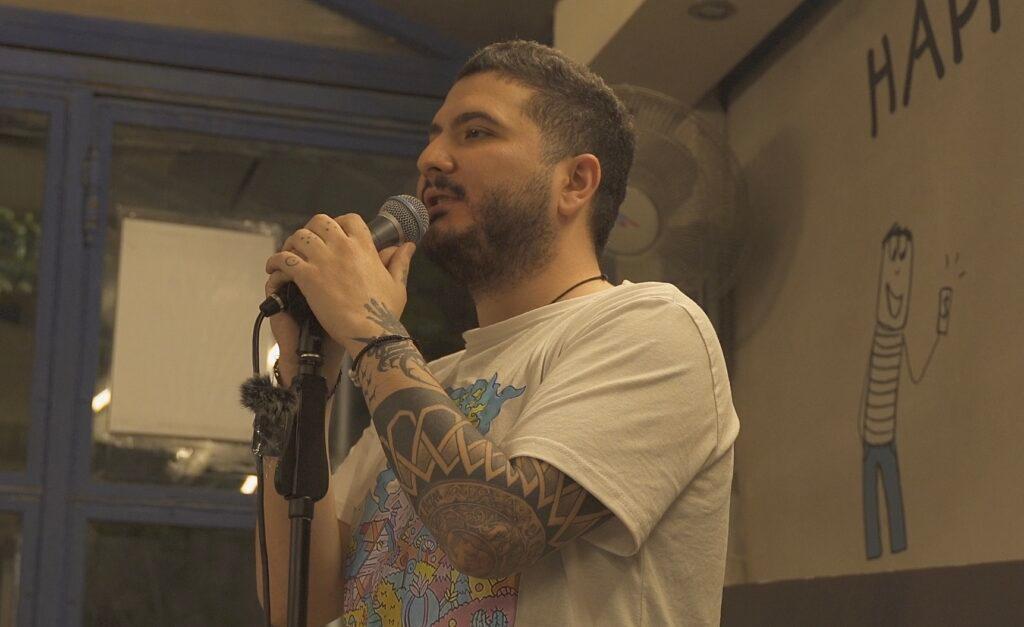As the sun set over central Damascus, laughter spilled out from the Karma Café. Inside, a young crowd gathered — some in headscarves, others without. But all were ready to experience stand-up comedy in a free Syria.
Comedy is having a moment in the country.
With the fall of the Assad regime, a new wave of artists is testing the limits of expression. Among them is Styria, a stand-up troupe whose name fuses Syria with hysteria, a nod to the absurdity and pain of living under dictatorship.
“There is a hysterical situation in Syria, so we need hysterical laughter,” said Sharif Homsi, founder of the group.
Homsi started writing comedy long before it was safe. Living under a regime that silenced dissent, he described the past as a kind of suspended state: “You’re not allowed to die, but you’re not allowed to live.”
In 2016, he left for Dubai, trained with Arab comedians, and later returned to his homeland to form Styria. Even then, performing comedy felt dangerous.
“One wrong word and someone could report you,” Homsi recalled. “You could disappear in a blink.”
So, the group played it smart, he said, avoiding politics, tiptoeing around religion and carefully crafting jokes about sex and social taboos. But now, with the old red lines shifting, they’re pushing the envelope further.
At the cafe in Damascus, Homsi took the mic, greeting the audience with humor and ease. His jokes, often about his own frugality or his dad’s job as a dog walker, sparked laughter and a sense of connection. But he didn’t shy away from sharper edges, even referencing the extremist past of Syria’s new leader, Ahmad al-Sharaa.
Jokes often don’t translate well, but Homsi gave this explanation of one that he told that night.
“We asked for freedom for 14 years,” he said, referring to the country’s civil war, but when we had it, we didn’t know what to do. It reminds me of the first time you have sex, you don’t know what you want to do — ‘I want to kiss her, I want to hold her, I want to …’ So, this is what we did with freedom, you know?”
Fellow comedian Ammar Daba, who returned after the regime fell, said the challenge now is not just legal limits, but social ones.
“It’s exciting and confusing. I don’t know where the lines are,” he said.
But Daba thinks comedians have a role to play in this new environment.
“It is our time, as stand-up comedians, to be the pioneers,” he said, “to tell people that ‘yeah, you can talk about that! You can talk about that outside of your private rooms and homes. You can say whatever you want even on the streets.’”
The night’s only woman performer, Mary Obaid (aka Meme), steered away from politics, instead poking fun at her own life and body image.
“Every problem, when spoken out loud, becomes smaller,” Obaid said. “Comedy helps us do that.”
After the show, a man who only gave his first name, Ibrahim, reflected on the performance.
“This is what we need here. We need to communicate our fears, our taboos, in a healthy way,” he said. “And this is the best way to discuss those really difficult issues.”
The crowd spilled into the Damascus night, still laughing and exchanging numbers.
For Sharif Homsi, the founder of Styria, this is the power of comedy. It can create moments of relief and respite, and it can start conversations that otherwise would not take place.
“Fifty, sixty people to a hundred sharing a room, laughing about similar things. … If they can laugh together, they can live together.”
Syrians have been divided for so long, he added.
“It’s time for that to end.”
